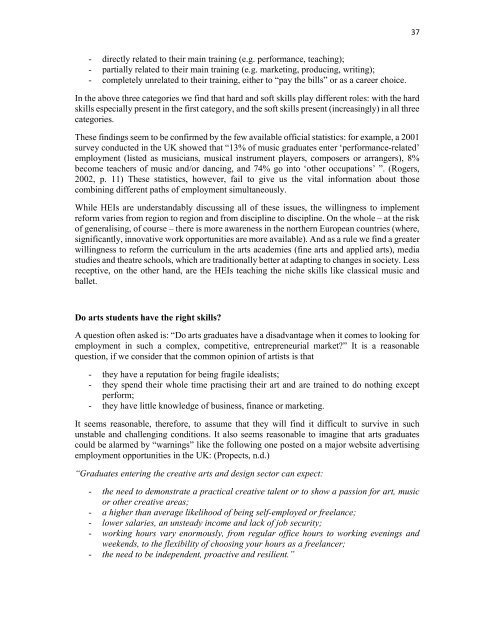and Music
Omega-Book
Omega-Book
You also want an ePaper? Increase the reach of your titles
YUMPU automatically turns print PDFs into web optimized ePapers that Google loves.
37<br />
- directly related to their main training (e.g. performance, teaching);<br />
- partially related to their main training (e.g. marketing, producing, writing);<br />
- completely unrelated to their training, either to “pay the bills” or as a career choice.<br />
In the above three categories we find that hard <strong>and</strong> soft skills play different roles: with the hard<br />
skills especially present in the first category, <strong>and</strong> the soft skills present (increasingly) in all three<br />
categories.<br />
These findings seem to be confirmed by the few available official statistics: for example, a 2001<br />
survey conducted in the UK showed that “13% of music graduates enter ‘performance-related’<br />
employment (listed as musicians, musical instrument players, composers or arrangers), 8%<br />
become teachers of music <strong>and</strong>/or dancing, <strong>and</strong> 74% go into ‘other occupations’ ”. (Rogers,<br />
2002, p. 11) These statistics, however, fail to give us the vital information about those<br />
combining different paths of employment simultaneously.<br />
While HEIs are underst<strong>and</strong>ably discussing all of these issues, the willingness to implement<br />
reform varies from region to region <strong>and</strong> from discipline to discipline. On the whole – at the risk<br />
of generalising, of course – there is more awareness in the northern European countries (where,<br />
significantly, innovative work opportunities are more available). And as a rule we find a greater<br />
willingness to reform the curriculum in the arts academies (fine arts <strong>and</strong> applied arts), media<br />
studies <strong>and</strong> theatre schools, which are traditionally better at adapting to changes in society. Less<br />
receptive, on the other h<strong>and</strong>, are the HEIs teaching the niche skills like classical music <strong>and</strong><br />
ballet.<br />
Do arts students have the right skills?<br />
A question often asked is: “Do arts graduates have a disadvantage when it comes to looking for<br />
employment in such a complex, competitive, entrepreneurial market?” It is a reasonable<br />
question, if we consider that the common opinion of artists is that<br />
- they have a reputation for being fragile idealists;<br />
- they spend their whole time practising their art <strong>and</strong> are trained to do nothing except<br />
perform;<br />
- they have little knowledge of business, finance or marketing.<br />
It seems reasonable, therefore, to assume that they will find it difficult to survive in such<br />
unstable <strong>and</strong> challenging conditions. It also seems reasonable to imagine that arts graduates<br />
could be alarmed by “warnings” like the following one posted on a major website advertising<br />
employment opportunities in the UK: (Propects, n.d.)<br />
“Graduates entering the creative arts <strong>and</strong> design sector can expect:<br />
- the need to demonstrate a practical creative talent or to show a passion for art, music<br />
or other creative areas;<br />
- a higher than average likelihood of being self-employed or freelance;<br />
- lower salaries, an unsteady income <strong>and</strong> lack of job security;<br />
- working hours vary enormously, from regular office hours to working evenings <strong>and</strong><br />
weekends, to the flexibility of choosing your hours as a freelancer;<br />
- the need to be independent, proactive <strong>and</strong> resilient.”


